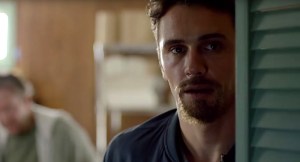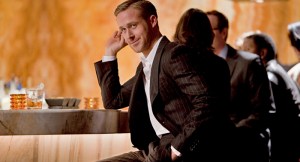SUNDANCE: A Filmmaker Makes His Pitch
Not everyone who comes to Sundance is a movie star, cinephile or studio head. Some, like filmmaker David Lindblom, are simply trying to get a project off the ground.
In Lindblom’s case, the project is a documentary about actor-director Romaine Fielding, a largely forgotten pioneer of silent cinema in the 1910s. And he believes that Fielding is one of the key figures in the history of independent film, and is ripe for rediscovery.
"He’s the patron saint of everyone in town right now," he said. "He wasn’t a total maverick, but he established the West as the key stage in American movies."
Lindblom, who works as a freelance film editor in New York, is hoping raise at least $230,000 to make his film. He came to Sundance with a 19-minute demo DVD, "No Star for Romaine," hoping to interest potential financiers.
"I’m not going to see any movies, and I don’t have to feel guilty about that," he said. "I just have to do this.
"I got a lot of encouragement," he said. "Not money, but encouragement."
Lindblom was able to make the case for his film at a meet and greet at the Filmmaker’s Lodge on Main Street, where a number of filmmakers pitched their projects to industry types. While filmmakers would prefer to concentrate on their movies than the pitch, they have no choice, Lindblom said.
"It’s a very efficient way to get out the word of your project and find a fit," he said. "It forces you to develop your pitch.
"You have to just do it," he said. "Even if you’re timid or self conscious, you have to do it."
Lindblom said he’s heard there are about 300 filmmakers in town pitching documentaries, and he knows docs about historical figures aren’t made as much these days. Still, he said the pitch process has been encouraging.
"Nobody’s just trying to be nice, so they try to be as frank as they can," he said. "It’s really nice when really smart people tell you have a good idea.
"It’s not like you come here with a film and there’s a bidding war," he said.
Looking for every angle, Lindblom said he hoped to get the film in the hands of Sundance guru Robert Redford. Lindblom thought this was unlikely, until he saw him on the street.
"Robert Redford was standing right there," he said. "I got it in his hands."
Lindblom feels the meeting is apt, as while Redford has supported independent cinema, Fielding was one of its earliest proponents.
Now largely forgotten, Fielding was once among the cinema’s most popular artists. He directed more than 60 films and starred in more than 70. Fascinated by the natural beauty of the area, he shot many of his films in New Mexico, potentially birthing the Western in the process.
However, there’s a good reason for Fielding’s obscurity today: many of his films are lost.
"It’s really quite buried," Lindblom said. "But there are people who do know about him."
Lindblom is particularly interested in "The Golden God," a 1913 epic about the rise of workers against a totalitarian government, not dissimilar in plot to "Metropolis." The film cost $50,000, a huge sum for the time, but was destroyed in a fire before its release.
Lindblom said the film could have been cited as a corrective to D.W. Griffith‘s "Birth of a Nation," still praised for its technique but derided for its celebration of the Ku Klux Klan. Still, while Fielding’s sympathies for Latinos, Native Americans and African Americans were not applauded by some critics, his films were still respected for their artistry, he said.
"The big issue is that the films are lost," he said. "It’s not a matter of him being censored out of existence."
In his film, Lindblom interviews Fielding’s granddaughter, a woman who played an infant in one of Fielding’s films, and Fielding’s biographer; he also includes footage and stills from Fielding’s films. He said he hopes to find more pieces of the Fielding story, and to rouse interest in the filmmaker’s legacy in the process.
"Maybe our brains are wired to find a lost piece of history," he said.
Check out Sundance features by Rotten Tomatoes:
• Sundance Full Coverage
• Sundance Blog
• Sundance Discussion






